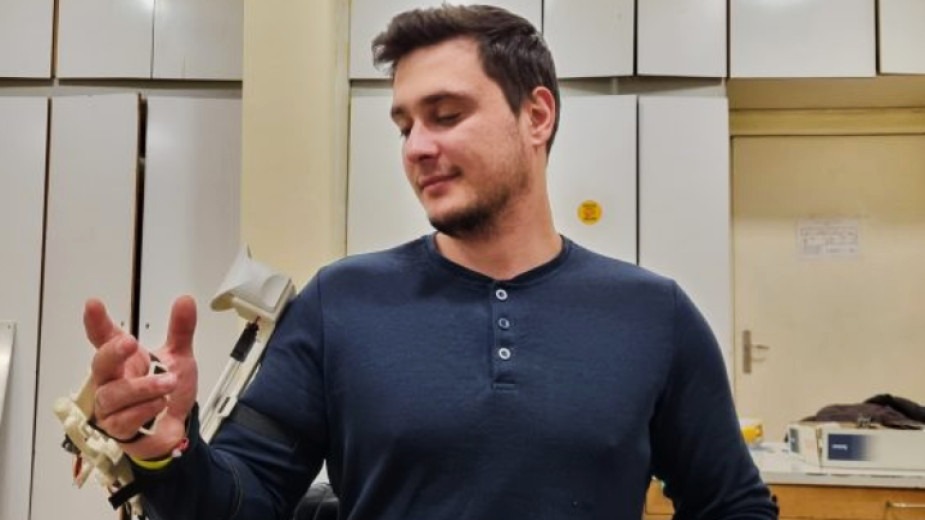A Bulgarian engineer devised a robot that will assist patients who have suffered strokes or have been in an accident. The invention is the work of engineer Petko Stoev who is doing a PhD at the Cyber-Physical Systems department of Institute of Information and Communication Technologies at the Bulgarian Academy of Sciences. He is also co-founder of a startup company for high-tech cyber-physical solutions and products aimed at improving the quality of life. For his cutting-edge invention the young scientist was recently awarded the Entrepreneurs in Science award of the Karoll Knowledge Foundation.

It was Petko Stoev’s childhood dream to be a robotics engineer and to devise products that will help solve different kinds of problems. And the idea to devise a robotic arm came to him after a close friend had a serious accident and was in need of rehabilitation.
The robot is exoskeletal, helping patients regain movement by way of rehabilitation procedures. The robotic arm performs the full range of arm movements for the purposes of rehabilitation, and can be controlled remotely.
What are the benefits of the new Bulgarian cyber invention? Here is the answer from Petko Stoev, who spoke to Alexander Raychev from the BNR’s Hristo Botev channel:
“The most important innovation is that by using this robot, patients and the people in need of rehabilitation after suffering stroke or serious injury with broken limbs, will be able to undergo the rehabilitation needed for a full recovery in the comfort of their own homes, or wherever they feel would be a good place to do so,” Petko Stoev says. “It means rehabilitation anywhere, anytime. When the patient is given such a robot for home use, doctors will be able to act autonomously, using a computer to set the parameters of the control programmes and so, remotely, the patient will be able to undergo rehabilitation at home.”

The Bulgarian invention will also make the process of constant monitoring by a medical professional easier. The system will record data of the procedures that have been carried out, and will send out reports of the progress each patient is making. And one more thing – one doctor will be able to control 5-6 robots remotely at the same time instead of having to treat a patient manually, and will be able to monitor them in real time.
“So that, per unit time, instead of dealing with one patient, the medic will be able to treat many. Our robot offers a solution to the problem of the limited capacity of hospital clinics, eliminating the problem of schedules and the potential of surgeries,” engineer Petko Stoev says.
As work on the robot progressed, a survey was conducted among medical experts in the country and 90% of feedback was positive. The medical professionals said that it will make their work easier and will reduce the risk of occupational diseases among rehabilitators, Petko Stoev says, and adds that the device is currently in the process of being patented and certified. The robot has been given the green light for clinical testing and has undergone laboratory validation.
More:
Interview by Alexander Raychev, Hristo Botev channel, BNR
Compiled and edited by Veneta Nikolova
Photos: karollknowledge.bg, re4life.eu
For the tenth time in a row, from June 6 to 8 the festival "Everyday Life in Medieval Tarnovgrad" will gather participants from different parts of Europe to re-enact the historical events and life of the city as they were between the..
During graduation ball season and as the school year draws to an end, in June we take a look at what young people’s interests and concerns are on the cusp of a new chapter in their lives after finishing school. Teenagers usually have lots of dreams..
It is exactly 100 years on 1 June, 2025 since the date was proclaimed International Children’s Day. And, as is the tradition, it is going to be a colourful day with lots of different events for the children throughout Bulgaria, with Sofia being the..
Southern Park 2 (behind the Earth and People museum) in Sofia is hosting the 5 th edition of the Asian festival dubbed “United in diversity”. The..

+359 2 9336 661
